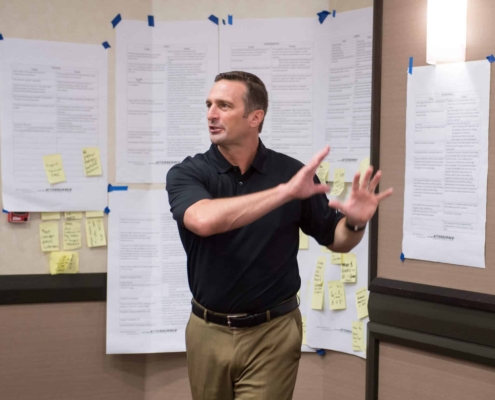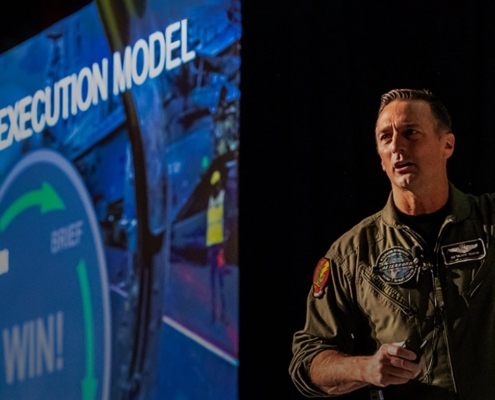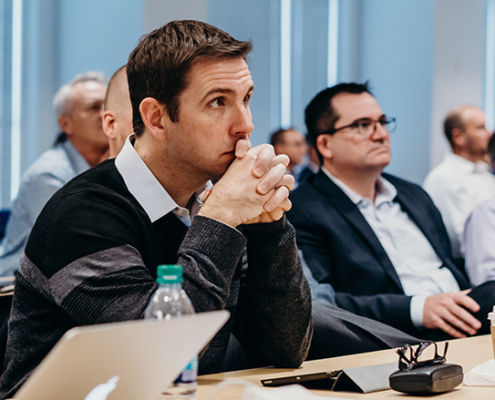 https://www.afterburner.com/wp-content/uploads/2024/09/leadership-symposium-afterburner.png
1050
1832
Nate Riggins
/wp-content/uploads/2024/07/Afterburner-Logo-Resize-Fullcolor-300x93.png
Nate Riggins2024-01-26 15:53:082024-10-23 10:53:39Decoding the 3 Crucial Leadership Situations
https://www.afterburner.com/wp-content/uploads/2024/09/leadership-symposium-afterburner.png
1050
1832
Nate Riggins
/wp-content/uploads/2024/07/Afterburner-Logo-Resize-Fullcolor-300x93.png
Nate Riggins2024-01-26 15:53:082024-10-23 10:53:39Decoding the 3 Crucial Leadership Situations
Book Review – Principles by Ray Dalio
Here’s a funny word for you – heuristic. ‘Heuristic’ isn’t exactly a synonym for ‘principle,’ but it is closely related and, perhaps, complementary. Ray Dalio’s Principles, a new book by the founder and chairman of the most successful investment firm in history, may be best described as a combination of these two terms. Principles is a mashup of autobiography and catalogue of rules for living and working. His choice of title is meaningful because the word ‘principle’ connotes values and beliefs more than a word like ‘rules’ – or another word like ‘heuristics.’ Heuristics is a fancy word for ‘rules of thumb,’ a phrase that pops up from time to time in Dalio’s narrative. A heuristic is good guidance that usually works, but isn’t necessarily guaranteed to work. Dalio doesn’t use ‘heuristic’ to describe his principles. However, he does warn readers that his list may have worked for his legendary firm, Bridgewater, but that readers should carefully consider each before accepting or applying them in their own life and business. Dalio rightfully acknowledges that context matters.
The core thread that connects the principles Dalio enumerates in his 592-page tome is what he calls “radical transparency.” It’s this same idea that we at Afterburner espouse as the fundamental ingredient of high-performing teams. Radical transparency, a frank admission and identification of error as well as transparency of action and thought, is something that flawlessly executing teams practice culturally because they formally practice it in the debriefing process.
Big Data
Principles also underscores the need to understand the difference between data and information and how computing power is best used to help us make better decisions. I recently recommended Principles to a senior executive at the National Security Agency as a result of a conversation we had about how big data and machine learning are often misunderstood by the general public. Data is nothing more than what its name implies. Big Data is just lots more data than you can possibly consume. Machine learning looks at data and tries to identify patterns in it. The identification of patterns creates something useful – information. You’ll find this basic explanation in Principles because Dalio has harnessed the power of big data and machine learning to generate useful information. But, it doesn’t stop there. That information then gets fed to the smartest machines on the planet . . . people. And not just one person, but many.
People are the foundation of Flawless Execution. You’ll find it at the base of the Flawless Execution Model. Dalio has cracked the code on people selection, engagement, and collaboration at Bridgewater by accepting that diversity of critical thought is essential to build a team that can make good decisions. In the investment industry, good decision-making directly translates to profit. In the grand scheme of things, Bridgewater’s experiment with radical transparency provides only a single data point. But it’s a data point that has $150 billion in assets under management.
Radical Transparency
The majority of the principles that Dalio describes lead to a capacity to make unbiased decisions based on evidence. Computing power and algorithms combine with human intelligence; what might be described as cognitive cybernetics (my phrase rather than Dalio’s). And that takes us back to the radical transparency needed to process information. Individuals have biases that you have to recognize and identify. Do that transparently, assemble a cognitively diverse and holistically balanced team, then present that team with information and watch the magic happen. Good decisions emerge because biases are overcome through radical transparency. Even the decisions and opinions that each individual makes creates data that can be evaluated by algorithms to yield patterns and improve the decision-making of the team. It’s a virtuous circle.
Principles is an instruction manual for decision-making in the digital age, or any age, for that matter. Good decisions matter more, now. We must begin integrating radically transparent thought processes with machine learning and big data to make better decisions in a world where everything is connected. One thing influences another thing . . . and another . . . and another. I agree with Dalio that processing such a complex model of the world soberly and with transcendent understanding is a capability every organization must master in the coming years. It will be a dangerous world. We will all need a list of guiding principles to help us navigate its dangers. Principles is a great place to start.
Referenced material:
Principles by Ray Dalio
Want to receive our monthly newsletter?
Share This Post
More Like This
 https://www.afterburner.com/wp-content/uploads/2024/09/leadership-symposium-afterburner.png
1050
1832
Nate Riggins
/wp-content/uploads/2024/07/Afterburner-Logo-Resize-Fullcolor-300x93.png
Nate Riggins2024-01-26 15:53:082024-10-23 10:53:39Decoding the 3 Crucial Leadership Situations
https://www.afterburner.com/wp-content/uploads/2024/09/leadership-symposium-afterburner.png
1050
1832
Nate Riggins
/wp-content/uploads/2024/07/Afterburner-Logo-Resize-Fullcolor-300x93.png
Nate Riggins2024-01-26 15:53:082024-10-23 10:53:39Decoding the 3 Crucial Leadership Situations https://www.afterburner.com/wp-content/uploads/2024/09/thethreebiggest-1.jpeg
931
1400
Nate Riggins
/wp-content/uploads/2024/07/Afterburner-Logo-Resize-Fullcolor-300x93.png
Nate Riggins2024-01-03 15:04:522024-10-23 10:53:40The Three Biggest Obstacles to Building Trust as a Leader Today
https://www.afterburner.com/wp-content/uploads/2024/09/thethreebiggest-1.jpeg
931
1400
Nate Riggins
/wp-content/uploads/2024/07/Afterburner-Logo-Resize-Fullcolor-300x93.png
Nate Riggins2024-01-03 15:04:522024-10-23 10:53:40The Three Biggest Obstacles to Building Trust as a Leader Today https://www.afterburner.com/wp-content/uploads/2024/09/creating-a-strategy-1.jpeg
664
1000
Nate Riggins
/wp-content/uploads/2024/07/Afterburner-Logo-Resize-Fullcolor-300x93.png
Nate Riggins2024-01-03 08:00:192024-10-23 10:53:404 Questions You Have to Ask When Creating a Strategy
https://www.afterburner.com/wp-content/uploads/2024/09/creating-a-strategy-1.jpeg
664
1000
Nate Riggins
/wp-content/uploads/2024/07/Afterburner-Logo-Resize-Fullcolor-300x93.png
Nate Riggins2024-01-03 08:00:192024-10-23 10:53:404 Questions You Have to Ask When Creating a Strategy https://www.afterburner.com/wp-content/uploads/2024/09/CVMV_0008.jpg
1547
2100
Nate Riggins
/wp-content/uploads/2024/07/Afterburner-Logo-Resize-Fullcolor-300x93.png
Nate Riggins2022-11-10 15:37:382024-10-23 10:53:435 Leadership Skills to Get Your Revenue Engine Roaring in Q4
https://www.afterburner.com/wp-content/uploads/2024/09/CVMV_0008.jpg
1547
2100
Nate Riggins
/wp-content/uploads/2024/07/Afterburner-Logo-Resize-Fullcolor-300x93.png
Nate Riggins2022-11-10 15:37:382024-10-23 10:53:435 Leadership Skills to Get Your Revenue Engine Roaring in Q4
A Word from Murph: Right Now, Leadership in Business Means Going Back to Basics
Inspiration, Leadership, Leadership Development https://www.afterburner.com/wp-content/uploads/2024/09/AdobeStock_198086711-1.jpeg
1265
2048
Nate Riggins
/wp-content/uploads/2024/07/Afterburner-Logo-Resize-Fullcolor-300x93.png
Nate Riggins2020-03-30 09:00:352024-10-23 10:53:457 Leadership Tips to Motivate Your Remote Employees
https://www.afterburner.com/wp-content/uploads/2024/09/AdobeStock_198086711-1.jpeg
1265
2048
Nate Riggins
/wp-content/uploads/2024/07/Afterburner-Logo-Resize-Fullcolor-300x93.png
Nate Riggins2020-03-30 09:00:352024-10-23 10:53:457 Leadership Tips to Motivate Your Remote Employees https://www.afterburner.com/wp-content/uploads/2024/09/woman-showing-how-to-improve-your-situational-awareness-with-map-in-background-1.png
667
1000
Nate Riggins
/wp-content/uploads/2024/07/Afterburner-Logo-Resize-Fullcolor-300x93.png
Nate Riggins2020-03-22 07:00:122024-10-23 10:53:453 Ways to Improve Your Situational Awareness
https://www.afterburner.com/wp-content/uploads/2024/09/woman-showing-how-to-improve-your-situational-awareness-with-map-in-background-1.png
667
1000
Nate Riggins
/wp-content/uploads/2024/07/Afterburner-Logo-Resize-Fullcolor-300x93.png
Nate Riggins2020-03-22 07:00:122024-10-23 10:53:453 Ways to Improve Your Situational Awareness https://www.afterburner.com/wp-content/uploads/2024/09/team-sitting-in-a-meeting-listening-to-how-to-cope-with-task-saturation-1.png
439
1000
Nate Riggins
/wp-content/uploads/2024/07/Afterburner-Logo-Resize-Fullcolor-300x93.png
Nate Riggins2020-02-14 09:00:522024-10-23 10:53:45Identifying your Task Saturation Coping Mechanisms
https://www.afterburner.com/wp-content/uploads/2024/09/team-sitting-in-a-meeting-listening-to-how-to-cope-with-task-saturation-1.png
439
1000
Nate Riggins
/wp-content/uploads/2024/07/Afterburner-Logo-Resize-Fullcolor-300x93.png
Nate Riggins2020-02-14 09:00:522024-10-23 10:53:45Identifying your Task Saturation Coping Mechanisms https://www.afterburner.com/wp-content/uploads/2024/09/Men-writing-in-notebooks-to-help-eliminate-task-saturation-1.png
511
1000
Nate Riggins
/wp-content/uploads/2024/07/Afterburner-Logo-Resize-Fullcolor-300x93.png
Nate Riggins2020-02-05 09:00:582024-10-23 10:53:453 Simple Ways to Eliminate Task Saturation
https://www.afterburner.com/wp-content/uploads/2024/09/Men-writing-in-notebooks-to-help-eliminate-task-saturation-1.png
511
1000
Nate Riggins
/wp-content/uploads/2024/07/Afterburner-Logo-Resize-Fullcolor-300x93.png
Nate Riggins2020-02-05 09:00:582024-10-23 10:53:453 Simple Ways to Eliminate Task SaturationAbout Us
Building Strong Teams Through the Guidance of Fighter Pilot Keynote Speakers.

